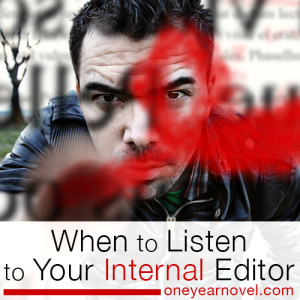When to Listen to Your Internal Editor
 By Gabrielle Schwabauer, Staff Writer
By Gabrielle Schwabauer, Staff Writer
Do you get burnt out partway through a rough draft because of the numerous story problems you encounter? Whether you set out with a careful outline or write by the seat of your pants, it may help to tune your ear to your own internal voice.
Outlining is a challenge. Plots tangle, ideas blur, and characters stubbornly refuse to reveal their desires, talents, and motivations.
When I wrote my first novel, I failed to give my outline the kind of meaningful thought it required. Oh, I completed The Map, but by the time I had waded a few chapters into the novel, the story had grown so large that my few scribbled sentences, while not technically inaccurate, were definitely inadequate. Once finished, that novel featured a few strong scenes and interesting ideas, but it failed completely when it came to clear, traceable plot and character arcs.
Outlining 2.0
Right now, I’m working on an even larger project. I frequently fall prey to fears that I’ll never be able to catch the characters, never evoke the emotion from readers that lives inside my head. But this time, instead of hiding from the questions that arise from my perpetually incomplete outline, I’m digging through the pile one at a time. Instead of placing my bets that the reader won’t notice plot holes, I’m taking care to weave my threads together in ways that make sense. When something doesn’t work, I start again.
Sure, I can attribute some of this breakthrough to the help I’ve received from others. I’ve brought excerpts to critique groups and friends, and their comments have often been useful. But one of my biggest writing revelations has been the simple realization that I need to start by listening to myself.
Internal Editing vs. Common Sense
You’ve heard it before: “Turn off your internal editor when you write!”
It’s good advice, but I think that some writers might confuse their internal editor with their nagging sense of doubt about a story’s logical consistency. An internal editor poses a problem when it won’t let you type a boring sentence or push through a bit of stilted dialogue. That second voice, though, is not some nitpicking roadblock; it’s your writing conscience telling you that you are being false in some way — That’s not realistic! or She couldn’t escape so easily! or Why isn’t he more angry?
In my first novel, I forced events and characters to conform to my preconceived ideas of how the story was going to go. I’d had vague ideas about chapter 11 from the start, so I manipulated and contorted the plot to force it to go there. It may not shock you to learn that this was highly ineffective!
With my second project, I’ve started listening to that little mental whisper that says “Why didn’t she get caught just then?” or “Why doesn’t he just tell someone that he’s leaving?” If I’m not convinced, the reader won’t be convinced. If I can think of an obvious answer or solution, the reader will too.
Haven’t you heard people laughing about horror stories in which the protagonist wanders into a dark alley alone to investigate mysterious shrieks of pain? That’s the kind of thing that makes astute readers roll their eyes. If you feel the need to explain away the convenience of a rescue or a character’s willingness to wander recklessly into danger, then you’re probably trying too hard to wallpaper over a crack in the “truth” of your story. Heed your own gut feeling that your explanation didn’t quite make sense.
Embracing Logic and Simplicity
When I used to stare at my outline in frustration, thinking “How can I get it to make sense that X thing didn’t happen here?” I would reply “Well, maybe I could make him choose to. . . “or “I suppose it might work if they . . .” Now, I’m practicing replying to myself with “Okay, what if it did? What if X did happen?”
Simply put: Don’t tie yourself in knots forcing convenient things to happen. If you need a really convoluted explanation for why Leanne didn’t get caught while breaking into the prison even though she has no special skills or resources, and you spend the whole scene inventing new reasons why this guard was sleeping and this guard was underground and this guard was dealing with a riot, then it’s time to let Leanne get caught instead.
Some of the most effective scenes in my writing have appeared when I stopped trying to twist the story to fit my original ideas and allowed myself to follow a path that was more natural for the character, more surprising to the reader, or more logically aligned with the current circumstances in the story. Loosen your grip on your original vision and ask yourself “What would actually make sense?”
Finding Balance
Of course, I don’t want to discourage aspiring writers. You don’t have to have every single question answered, your outline completed with one final glorious flourish, in order to write a productive rough draft. All stories grow and change over time. No matter how carefully you outline, you will always realize about 80% of the way through your novel that you’re going to have to make some major change to plot or character in editing. It’s inevitable, so embrace it.
What I do want to discourage is the practice of laziness. It’s one thing to begin a rough draft with the knowledge that it’s going to come out as a messy, jumbled, imperfect narrative. It’s quite another to blindly ignore gaping plot holes or characters with no motivation.
If you know in the back of your mind that a significant element of the story just isn’t working, change it! Put a pause on your Pinterest board and your character lounges and your inspirational playlist. Bite the bullet and look at your plan for the story. Once you’ve identified your novel’s conceptual bumps and bruises, getting input from fellow writers (who can see your story with the impartial eye of an outsider) can be invaluable, especially while you’re still in the brainstorming stage.
Why So Harsh?
Well, because the longer you go without addressing these faulty story elements, the worse they get. That bad idea from chapter 3 influences the rest of the novel. When you’ve woven it through the entire rough draft, it’s a lot harder to extract than it would have been if you’d listened to your gut feeling of dissatisfaction halfway through chapter 4.
Also, when you write 90,000 words based on a cracked foundation—a character or plot point or setting that doesn’t quite feel real—you make it ten times harder on yourself to come up with an alternate solution. You’ve already run story-grooves into your brain, and your brain will resist major changes.
Say your sidekick, Lacey, has felt flat and boring since you first imagined her. The solution, you think, is to shrink her role in the story and use her as a mentor for the hero instead of a wisecracking ally. If you’ve only thought of Lacey as headstrong and defiant for a month, you won’t have too much of a struggle shifting her role to that of the calm and steadfast mentor. If it’s been 18 months of ignoring the Lacey-problem, it will be much, much harder to retrain your brain to imagine her in any role other than her original, flawed one.
In essence: listen to the still, small voice of your writing conscience when it whispers to you that something in your story isn’t working. It is trying to point you toward a more interesting story, one that will immerse the reader instead of making him raise a single skeptical eyebrow. Buckle down and tweak your story-solutions until they feel functional and logical to you. Trust me—you’ll thank yourself in the long run.
…
Have you ever gotten into trouble by ignoring obvious problems in your manuscript? What did you do about it later?
…

About Gabrielle
Gabrielle Schwabauer has loved stories for as long as she can remember. (The Lord of the Rings holds the top spot, as it has for twelve years running.) She likes reading books, playing video games, eating stromboli, looking at pictures of sloths, and having already written today.



Excellent points! I’m so glad you wrote this.
I love, love, LOVE this post. Excellent job! I so appreciate the distinction you made between the voices of the internal editor and your deeper writing conscience. I’ve often had the feeling I was missing something, but just now made the connection.
Unfortunately, I haven’t written [fiction] seriously in over a year–partially due to busyness, but also in part because of the way my last attempt ended. I’d been making the exact mistakes you described here, and the thing is, I knew it was a mistake. I knew something was wrong with how I was going about trying to “fix” things, and so I quit out of frustration.
Things got too complicated. I let obvious plot holes slide, and tried to force the story to take the path I’d imagined for it, all while attributing the nagging issues to that beast of an internal editor. Which most of them weren’t.
This post was incredibly eye-opening for me, and perhaps I’ll even start to write again. Thanks for sharing!